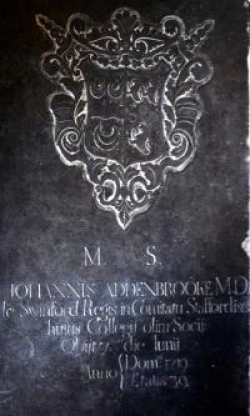John Addenbrooke

- Born
- Unknown
John Addenbrooke was born in Staffordshire in 1680, the only child of a vicar. He went to the University of Cambridge at the age of 17, as a ‘pensioner’ – this was a student who paid for their own tuition.
At that time, the teaching of physicians was not well organised. The University Calendar of 1702 advised students that “a student of medicine in this University is not required to attend any lectures but is left to acquire his knowledge from such sources as his discretion may point out.”
Although the details of Addenbrooke’s teaching are not known, he would have studied traditional medical texts and would have sought private tuition from medical Fellows, as well as visiting the local apothecary (who had a similar role to a pharmacist today). He qualified as a physician in 1710.
During his studies, he had collected a number of specimens, known as Materia Medica. In the same year as his qualification, he gave the collection to Catharine Hall (later to become St Catharine’s College). The college still owns this collection which contains a number of drugs and medicines from the time.
to hire, fit up, purchase or erect a building for a small physical hospital
in the town of Cambridge for poor people of any Parish or any county
The instruction in Addenbrooke’s will, quoted in a Cambridge University Hospitals document.
Addenbrooke died at the age of 39. At that time, there was no help from the local parish for the sick. He left around £4,000 in his will that he instructed should be used to set up a hospital in Cambridge for the poor. He was the first person in England to leave his personal wealth to fund the building of a private hospital.
Addenbrooke’s hospital opened in Cambridge on 13th October 1766. It had 20 beds, three physicians, three surgeons and one matron. Originally, the hospital was located on Trumpington Street, but as the demands on it grew, it moved to the southern edge of the city in 1976.
Addenbrooke’s Hospital now has more than 1000 beds and is part of the Cambridge Biomedical Campus. It is the largest health science and medical research centre in the UK and is also home to the Cambridge University School of Clinical Medicine.



